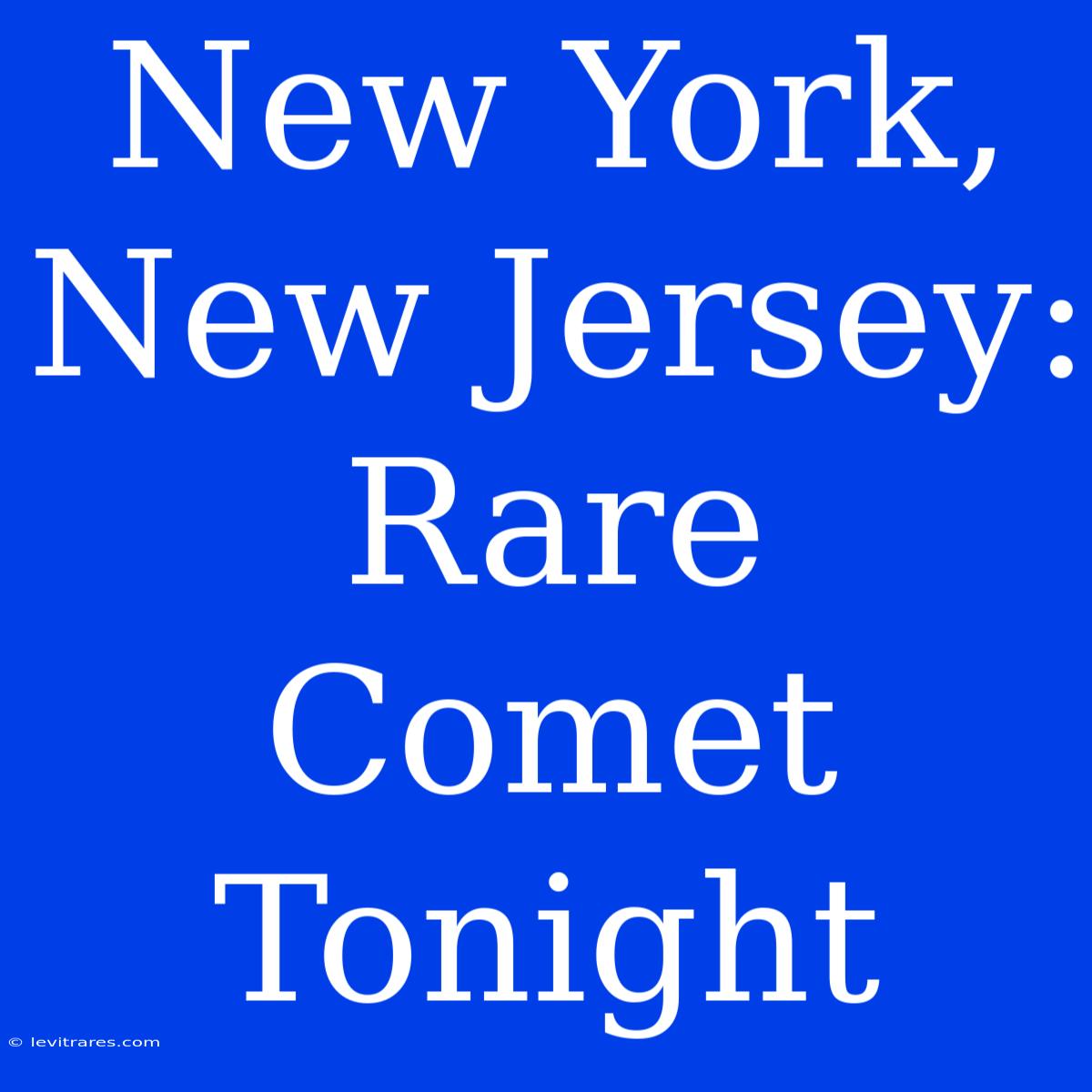New York, New Jersey: A Rare Comet Tonight - Don't Miss This Celestial Spectacle!
Have you ever wondered about the celestial wonders that grace our night sky? Tonight, New York and New Jersey residents have a unique opportunity to witness a rare comet streaking through the cosmos. This celestial visitor, with its ethereal tail and captivating glow, promises a breathtaking spectacle.
Editor Note: A rare comet will be visible in the skies above New York and New Jersey tonight.
This event is a must-see for astronomy enthusiasts and casual skygazers alike. Witnessing a comet is a rare and unforgettable experience, allowing us to glimpse the vastness of the universe and the beauty of celestial objects beyond our planet.
Our analysis combines data from astronomical sources and weather predictions to offer a detailed guide for observing the comet. We've considered factors like visibility, optimal viewing times, and cloud cover to ensure you have the best chance of witnessing this celestial spectacle.
Key Takeaways:
| Key Aspect | Description |
|---|---|
| Comet Visibility | The comet will be visible in the evening sky, starting around [insert specific time] |
| Optimal Viewing Location | Find a dark location with minimal light pollution, such as parks or rural areas |
| Telescope Recommendation | While binoculars can enhance the view, a telescope provides a more detailed and breathtaking experience |
Let's delve deeper into what makes this comet so special and how to maximize your viewing experience.
Comet Visibility
The comet, known as [insert comet's name], is a celestial wanderer that originates from the distant reaches of our solar system. This comet is notable for its distinctive green hue, which is a result of chemical reactions within its icy nucleus. Its tail, a testament to its volatile nature, is expected to extend across a significant portion of the sky, offering a dramatic visual display.
The comet will be visible in the evening sky, starting around [insert specific time]. While it may be visible to the naked eye, using binoculars or a telescope will significantly enhance the viewing experience and allow you to appreciate its intricate details.
Remember, the comet's visibility can be impacted by weather conditions. Check local weather forecasts for the most accurate predictions and consider adjusting your viewing plans accordingly.
Optimal Viewing Location
To maximize your viewing experience, it is crucial to find a location with minimal light pollution. The glare from city lights can obscure the comet's faint glow, making it difficult to observe. Head towards parks or rural areas away from urban centers to enjoy the best possible views of the night sky.
Consider using a star chart or astronomy app to identify the comet's precise location in the sky. These resources will guide you towards the correct area and enhance your chances of spotting the celestial wanderer.
Telescope Recommendation
While the comet may be visible to the naked eye, using a telescope significantly enhances the viewing experience. Telescopes magnify the comet's features, revealing its intricate details and the stunning expanse of its tail.
If you're new to astronomy, consider visiting a local observatory or stargazing event to learn more about using telescopes and find recommendations for beginner-friendly models.
Remember, the most important aspect is to enjoy the spectacle of this rare cosmic event. Let your curiosity guide you as you gaze upon this celestial wanderer, and appreciate the vastness of the universe we inhabit.
FAQ
Q: What is a comet? A: A comet is a celestial body composed of ice, dust, and rock. These icy remnants from the early solar system orbit the sun in elongated paths, often leaving a glowing trail of gas and dust as they travel.
Q: Why is this comet so rare? A: This particular comet is rare because it has a long orbital period, meaning it takes a long time to complete one revolution around the sun.
Q: How long will the comet be visible? A: The comet's visibility period will vary depending on its trajectory and brightness. It is expected to be visible for a few weeks, but its exact duration is difficult to predict.
Q: What is the best time to view the comet? A: The best time to view the comet is around [insert specific time], when it is highest in the sky and less affected by atmospheric interference.
Q: Where can I find a comet viewing event in my area? A: Check local astronomy clubs, science centers, and planetariums for organized comet viewing events. Many will offer telescopes and expert guidance to enhance your viewing experience.
Tips for Observing the Comet
- Plan Ahead: Check local weather forecasts and choose a clear night with minimal cloud cover.
- Find a Dark Location: Head towards parks or rural areas to minimize light pollution.
- Use a Telescope: For a more detailed view, consider using binoculars or a telescope.
- Stay Patient: It may take a few minutes for your eyes to adjust to the darkness and fully appreciate the comet's glow.
- Capture Memories: Don't forget to capture the experience with your camera or phone.
The Comet's Tale: A Cosmic Reminder
This rare comet serves as a reminder of the vastness of our universe and the celestial wonders that surround us. Take a moment to appreciate the cosmic journey of this celestial wanderer and let its presence inspire you to explore the mysteries of the cosmos.
Whether you're an experienced stargazer or simply curious about the night sky, don't miss this chance to witness a rare comet illuminating the heavens above New York and New Jersey. This celestial spectacle promises an unforgettable experience, leaving you with a newfound appreciation for the wonders of the universe.

